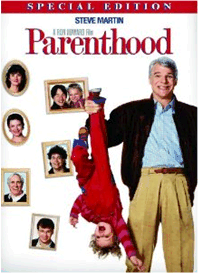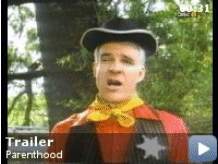The red pill (harsh reality) version __ 7.5/10
Review by Brian Wright
 Grandma: You know, when I was nineteen,
Grandma: You know, when I was nineteen,
Grandpa took me on a roller coaster.
Gil: Oh?
Grandma: Up, down, up, down. Oh, what a ride!
Gil: What a great story.
Grandma: I always wanted to go again. You know, it was just so interesting to me that a ride could make me so frightened, so scared, so sick, so excited, and so thrilled all together! Some didn’t like it. They went on the merry-go-round. That just goes around. Nothing. I like the roller coaster. You get more out of it.
Grandma nails it. Her statement comes in the final scenes and synopsizes the life situation of Gil Buckman (Steve Martin) and Karen Buckman (Mary Steenburgen) and family to a tee. Life and family life, when truly lived, is a rocky sort of thing: the peaks and valleys are fairly evenly dispersed. No constant rose garden to be found. The question is: does the movie—with its seemingly neverending crises from this quarter and that: child development problems, teenage angst, gambling and alcohol addictions, control-freak parenting, professional disappointments, sexual issues, and emotional remoteness—stand up as entertainment?
It’s safe to say that one’s appreciation of the high-realism Parenthood may be a matter of personal taste. My own meter pegs at 7.5 out of 10; but consider that I have never experienced the joys and sorrows of having a family of my own. [I’ve been part of a family, however: For the first 13 years—from my perspective anyway—it would give the idyllic pleasantries of Leave it to Beaver a run for their money, then from that point on wound up just short of the Dark Side.] The focus of Parenthood is, yes, parenting, what’s the right way and what’s the wrong way. So myself never having been a parent (yet) we need to take my comments with a grain of salt.
Frank Buckman (Jason Robards) is the patriarch of this Chicago clan, and pretty clearly his fathering—of Gil, especially, and his sisters Karen (Dianne Wiest) and Susan (Harley Jane Kozak)—leaves a lot to be desired. The opening scene has present-day Gil at the ballpark, only the camera shows him back in time as a child: his old man as a ritual brings Gil to the game on his birthday, but sits him in the care of an usher while Frank wanders off to see his bookie and pound back a few. Gil is a conscientious boy who turns into a conscientious and caring parent, part of whom wants to make up for the sins of his own father. And he’s doing a fine job.
But Gil’s boy Kevin is causing disturbances at school and acting out, he tries to play baseball on the team Gil coaches, but he’s not any good, and the other boys put him down. The school wants to put Kevin in a special class for challenged children, they trot out the shrink and stress that as a public school they can’t spend a disproportionate amount of time on one child. The data seems even-handed on the side of the officials and on the side of Gil and Karen who are trying to deny that there’s anything wrong. This parental situation is representative of the virtues of Gil and Karen… and also the movie:
 They don’t give up, and they don’t walk away. Eventually, things work out. That is essentially the theme of the film… along with parenthood and family being a roller coaster worth taking the trouble for. When you apply the reality test to Parenthood, well, nobody’s family contains this much drama. So as much as writer Lowell Ganz and director Ron Howard want to give us more than our money’s worth on the serious side they balance it with a reasonable amount of comedy, too. Of course, Steve Martin is one of a kind in that department, and doesn’t disappoint—you’ll get a snick or two out of the vidclip on the right, and of the full segment in the film where Gil tries to entertain Kevin and his friends on Kevin’s birthday.
They don’t give up, and they don’t walk away. Eventually, things work out. That is essentially the theme of the film… along with parenthood and family being a roller coaster worth taking the trouble for. When you apply the reality test to Parenthood, well, nobody’s family contains this much drama. So as much as writer Lowell Ganz and director Ron Howard want to give us more than our money’s worth on the serious side they balance it with a reasonable amount of comedy, too. Of course, Steve Martin is one of a kind in that department, and doesn’t disappoint—you’ll get a snick or two out of the vidclip on the right, and of the full segment in the film where Gil tries to entertain Kevin and his friends on Kevin’s birthday.
Several other notable comic relief moments are thrown in, and it’s a good thing. Otherwise you could get depressed. The acting is first rate, as one might imagine with Robards, Wiest, and Hulce—each earning at least one Oscar or nomination over the years. For a film two decades old, it stands up well in all the categories. At the time of creation, you have to believe Ganz and Howard wanted to make a statement about family living that would mean something. By raising some true and distressing issues that affect so many parents and children, they perform a strong public service and deliver a valuable message: embrace the ‘sup, don’t give up, don’t walk away, and enjoy the ride.
This post has been read 3080 times!



Excellent review, my Friend. Everyone at some point in time has a family in the sense that they give fatherly advice even if they’re not a father, per se. All are family, whether functional or dysfunctional. The movie covers a broad spectrum of different types of marriages. Some we know will not survive, but we know life will go on. As we all know, if you just stand in line to ride the coaster, the fun or horror belongs to everyone else. You may as well take a shot.